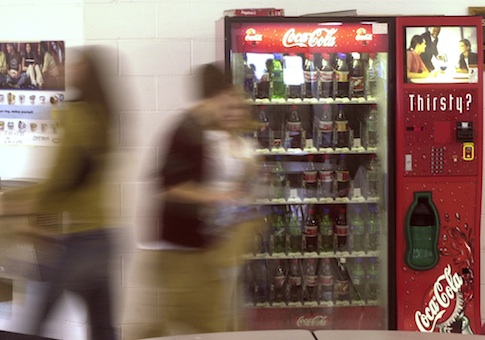A bill introduced in the California senate would require warning labels for soda and give state bureaucrats the authority to inspect businesses to ensure compliance.
Sen. Bill Monning (D.) introduced the "Sugar-Sweetened Beverage Safety Warning Act" last week in the name of "public health," which would prohibit selling soda or any sweetened drink with 75 calories or more without a safety warning.
"When the science is this conclusive, the State of California has a responsibility to take steps to protect consumers," Monning said in a statement. "As with tobacco and alcohol warnings, this legislation will give Californians essential information they need to make healthier beverage choices."
The bill would "prohibit a person from distributing, selling, or offering for sale a sugar-sweetened beverage in a sealed beverage container, or a multipack of sugar-sweetened beverages, in this state unless the beverage container or multipack bears a specified safety warning."
Sam Batkins, director of regulatory policy at American Action Forum, said the proposed regulation is unnecessary.
"It’s not too surprising state and federal governments want to add another layer of redundant regulation," said Batkins. "Soft drinks already have information on sugar and calories, but it appears that regulators don’t trust consumers to make healthy choices."
The message would be similar to warnings from the Surgeon General displayed on cigarettes: "STATE OF CALIFORNIA SAFETY WARNING: Drinking beverages with added sugar(s) contributes to obesity, diabetes, and tooth decay."
The warning must be in capital letters and the "entire safety warning shall appear in bold type." For drinks 8 ounces or less "the safety warning shall be in script, type, or printing not smaller than 1 millimeter, and there shall be no more than 40 characters per linear inch."
The label has to be "prominently displayed" on the front of the drink, and "shall be on a contrasting background."
If the safety warning is not printed directly on the beverage container, it "shall be affixed to the beverage container in such a manner that it cannot be removed without thorough application of water or other solvents."
Every "sugar-sweetened beverage" would be required to carry the label. The legislation defines "sugar-sweetened beverage" as "any sweetened nonalcoholic beverage, carbonated or noncarbonated, sold for human consumption that has added caloric sweeteners and contains 75 calories or more per 12 fluid ounces."
Milk, dietary aides, "oral nutritional therapy," 100 percent natural fruit juice, vegetable fruit juice with no added sweeteners, and infant formula would be exempt.
Vending machines would also have to display the safety warning, and require businesses to keep invoice records of all sugar-sweetened beverages "distributed, purchased, or sold," for two years.
"The department and a local enforcement agency shall have the right to inspect, examine, and copy those records at any time during normal business hours for the purpose of ensuring compliance by distributors with the requirements of this article," the bill said. "The refusal to allow a full inspection, examination, or copying of those records shall constitute a violation of this article."
Failing to comply with the legislation would result in a $50 to $500 fine. If passed, the bill would go into effect July 2015.
"It is the intent of the Legislature, by enacting this article, to protect consumers and to promote informed purchasing decisions by requiring a warning about the harmful health effects that result from the consumption of drinks with added sugars," the legislation said.
Monning’s office said the bill is necessary for California’s "communities of color."
"The health implications are felt most acutely by California’s communities of color, which are the largest consumers of these sugary drinks," a press release said. "Unless the obesity epidemic is reversed, one in three children born after 2000—and nearly half of Latino and African American children—will develop Type 2 diabetes in their lifetime."
